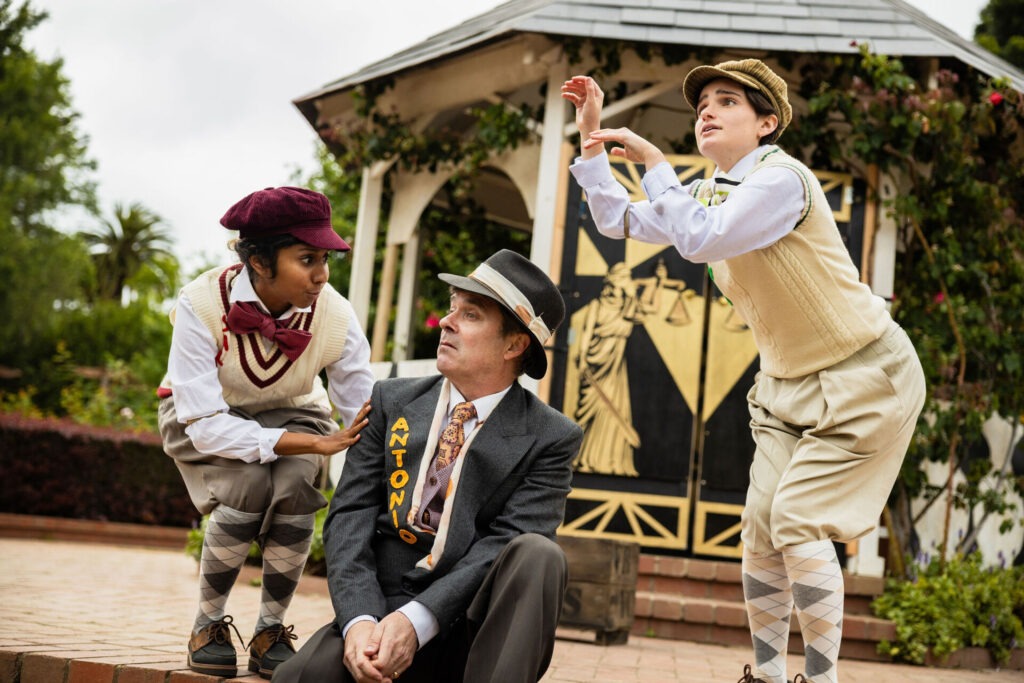
‘The Merchant of Venice’ // Melbourne Shakespeare Company
‘The Merchant of Venice’ was thought-provoking.
William Shakespeare is a legendary wordsmith. There is no denying this. His influence upon English literature (and theatre) is paramount. More than 400 years since his death, his work is still taught in English classrooms and performed in theatres around the world. It may be fair then to question why his work is still held in such high regard today when his lived experience was different than ours today.
While there is no denying that there is truth to this, it is important to note that the themes he imbued throughout his collection of plays and sonnets is both universal and timeless. Even in contemporary society, his work has the ability to teach, ask questions, invite discussion, and spark debate. It is this philosophy that has inspired the Melbourne Shakespeare Company’s (MSC’s) latest production of the Bard’s classic comedy, ‘The Merchant of Venice’.
‘The Merchant of Venice’ marks the MSC’s third Shakespearean production for the year after ‘The Tempest’ in March and ‘Julius Caesar’ in September. It is interesting to consider the choice of these plays as they each can be slotted into numerous genres depending upon how they are viewed. While ‘The Merchant of Venice’ is officially recognised as a comedy, its themes and modern interpretations have somewhat blurred its definition. As the MSC themselves note, their production comes at a time of great divide in the world which makes it all the more important to discuss. Perhaps therein lies the power of Shakespeare?
Published between 1596-1597, ‘The Merchant of Venice’ is believed to be amongst one of Shakespeare’s earlier comedies. The play tells the story of Antonio, the eponymous merchant of Venice, who in an effort to assist his friend Bassanio’s quest to woo his beloved Portia, takes out a loan against the Jewish moneylender, Shylock. As collateral, Shylock demands the loan’s equivalence be paid with “a pound of flesh”. What transpires is a tale of love, money, loss, and devotion.
As is customary with many of Shakespeare’s comedies, the play features several allusions to love, mistaken identity, and twisted fate. Renowned for two of its speeches dealing with the themes of equality and mercy, ‘The Merchant of Venice’ is frequently performed on stage, screen and radio. Some of its most notable adaptations included a 1914 silent film; a 1972 telemovie starring Maggie Smith; a production by the Royal National Theatre in 2001; an opera by André Tchailkowsky; and a BBC radio drama in 2018. ‘The Merchant of Venice’ was most recently performed at London’s Globe Theatre during the winter season of 2021-22. It now makes its way to Melbourne in an abridged 90 minute version courtesy of the MSC, performing in the picturesque rose garden of St Kilda’s Botanical Gardens.
The MSC is accustomed to performing their productions outdoors. Their chosen venue of the St Kilda Botanical Gardens, more specifically its Rose Garden, is a beautiful one. Artistic Director Jennifer Sarah Dean and Stage Manager Naeve Kennedy demonstrate a keen eye for picking location scouting. Their choice to perform ‘The Merchant of Venice’ within St Kilda’s pristine Rose Garden solidifies their understanding of the text’s cultural backdrop. Set amongst sweeping native trees and vibrant flowers, the garden is truly picturesque. A single rotunda stands in the middle of the garden, signifying a focal point for the action. Cobblestone pathways lay around the area to further elicit a romantic Italian afternoon. Rounded steps cascade from the rotunda as if to form a natural heightened stage. Using the garden as a stand in for an official set is clever, particularly due to its Italian villa-feel.
All of this is not to say there is not any set costuming involved. Designed by Abbey Stanway, the furnishings of ‘The Merchant of Venice’ all aid to heighten the romantic aesthetic of the play’s Italian setting. The rotunda’s window frames are decorated with soft white curtains, providing the aesthetic of waking up in the morning to look out upon the Tuscan beauty below. Wooden panel doors are erected at the front of the rotunda. A gold and black mirror image of Justitia – the Roman goddess of justice – is painted upon each door. This provides a nod to another prominent theme flowing throughout the play. Three wooden crates are placed towards the front, each baring the name of a fictional shipping company inspired by some of the Bard’s most famous plays – Montague & Sons (‘Romeo and Juliet’), Othello & Co. (‘Othello’), and Birnam Wood Shipping (‘Macbeth’). The furnishings may be limited compared to the backdrop, but they are nonetheless integral to transporting audiences to Elizabethan Italy.
Modern adaptations of Shakespeare’s plays often utilise contemporary costuming as a way of bridging the divide between its Tudor setting and present-day audience sentiment. This is no different in the case of ‘The Merchant of Venice’. Costume Designer Cortnee Jarvis transports the characters from the 16th to the 20th century. Emblazoned in 1920s jazz-style fashion, the performers showcase their individual characterisation. Suspenders, knee-high socks, summer dresses, and gangster suits are aplenty. The ‘dress up’ feel of the production is comical, yet fun. Jarvis uses the play’s humorous nature as inspiration for the wardrobe, while also keeping it in the realms of believability.
Each member of the cast has their character’s name sewn onto their garments somewhere in cut-out felt letters. While at first this decision feels a tad on the cheesy side, it soon becomes useful as more characters enter the story (with some actors even taking on dual roles, making the names all the more beneficial).
Costuming is not the only element of ‘The Merchant of Venice’ bridging the gap between the play’s origin and modern theatre. The show’s music is filled with classic songs from the past few decades. Music Director Natalie Calia takes inspiration from the cast and crew’s childhood in deciding which songs will feature. Its two most prominent songs – Cab Calloway’s “Minnie the Moocher” and Ray Charles’ “Hit the Road, Jack” – continue the production’s allusion to 1920s culture. It is in the closing moment of the show, where Jessica reads a letter about her mother Shylock’s fall from grace, that the music truly feels important. Singing a sweet, short reframe from a zemirot (Jewish hymn), Jessica’s subtle hint of grief is beautifully heartbreaking and truly a winning moment for the production. Members of the cast play instruments throughout the show themselves. Led well by Music Captain Alice Albon and Assistant Director Emma Austin, the onstage soundtrack of ‘The Merchant of Venice’ is, for the most part, joyfully sentimental. While the show does not require musical interludes, their inclusion uplift the production to another level of excellence.
Austin does not stop at donning a musician and performer hat, she also serves as support to Director Ben Margalith. In collaboration with Producer Michael Mack, the trio of creatives aim to present the classic story in a refreshingly fun, earnest way. Margalith, Austin, and Mack frame the production as a snippet of daily life for the characters. In grounding the play, they provide the audience with the notion that each character’s life can be entertaining, no matter how dramatic. They demonstrate an apt ability to utilise their location to their advantage. While scenes play out in front of the rotunda, characters cheerfully meander in the background of the Gardens as if enjoying a leisurely Sunday afternoon stroll. The air of calm monotony aids the overall premise of the play. It highlights the importance of showcasing the regular existence of these characters, and demonstrates that they have lives outside of the action of the story.
Taking inspiration from his own lived experience, Margalith breathes a fresh, considered life into the comedy. Reasoning that the story has shades of drama, prejudice, and contentious issues in modern-day society, Margalith makes an intriguing decision to frame the show as a comedy-drama hybrid. While traditionally Shylock has been played as villainous, Margalith endeavours to humanise the character, wishing for audiences to find empathy for her. This is the key driving force flowing throughout MSC’s ‘The Merchant of Venice’. It aims to showcase the nuances and problems of societal prejudice from all sides, not simply the villain’s. In the Q&A after the show, Margalith stresses the importance of raising such issues in this tale given what is happening in the world presently. It is a bold move to reframe Shakespeare in such a way, but something for which the audience as sure to praise MSC and Margalith for doing.
‘The Merchant of Venice’ boasts an array of talented actors. Each member of the cast adds an element of intrigue to the production. Arguably, it is the interplay of the cast as a whole is the show’s strongest element. The universal chemistry of the cast is resolute.
While all members of the cast have their individual moment to shine, there are a select few standouts that audiences are sure to remember fondly. Alice Albon is mesmerising as the cheeky Salanio. Eleni Vettos provides the tactful Portia equal measures of grace and fervour. Emma Austin laps up the scenery as the Prince of Glasgow (“or did the director say ‘Morocco’?) Maxwell Simon’s comedic timing as Lancelot Gobbo will have audiences in fits of laughter. So too will Amanda McKay’s Nerissa, who manages to shine in every scene she performs.
The toughest role falls onto Shelley Krape’s shoulders. Playing the gender-swapped Shylock, Krape manages to infuse a sprinkle of sympathy in to villainous character. The play aims to compensate for the play’s accused antisemitism by framing Shylock in a three-dimensional, considered lens. Krape’s respect for and understanding of the character, as well as the piece as a whole, allows for the show to critique such issues in a sensitive, compassionate way. Krape provides a sad yet sympathetic humanity to Shylock. For this she is commended.
Although an undeniable classic of Shakespeare’s first folio, ‘The Merchant of Venice’ does have some problematic elements for today’s society. Instead of shying away from them, the Melbourne Shakespeare Company aim to address them with respect and integrity in their latest production. They do not lose sight of the play’s comedic origins; instead, they reframe their production to showcase the wide spectrum of emotions such a tale can (and perhaps should) make audiences feel. ‘The Merchant of Venice’ is a pleasing production which will not only make you laugh and sing, but make you think too. And that is the true power of Shakespeare!
‘The Merchant of Venice’ performs until Saturday, 23 December 2023 at the St Kilda Botanical Gardens. For more information, or to purchase tickets, visit the Melbourne Shakespeare Company’s website.






